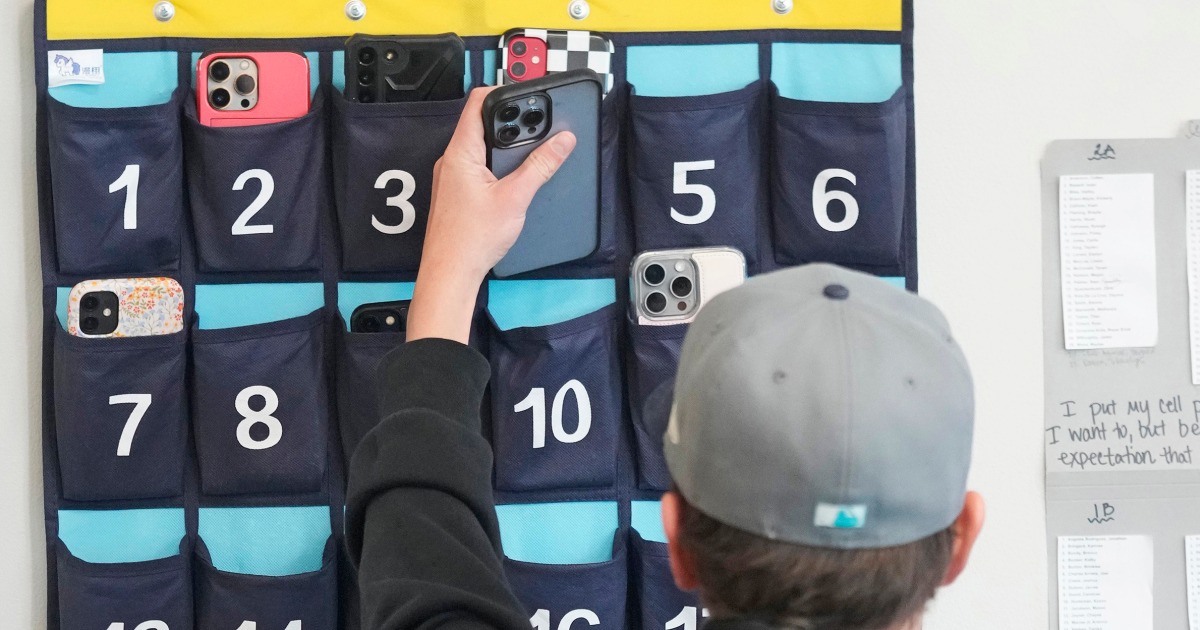In California, a high school teacher complains that students watch Netflix on their phones during class. In Maryland, a chemistry teacher says students use gambling apps to place bets during the school day.
Around the country, educators say students routinely send Snapchat messages in class, listen to music and shop online, among countless other examples of how smartphones distract from teaching and learning.
The hold that phones have on adolescents in America today is well-documented, but teachers say parents are often not aware to what extent students use them inside the classroom. And increasingly, educators and experts are speaking with one voice on the question of how to handle it: Ban phones during classes.



To give you a genuine response, it is at least conceivable that the potential harm caused by allowing students with adolescent brains constant access to platforms that are explicitly and intentionally designed to be as addictive and distracting as possible is greater than the positive impact of outing the occasional bigoted teacher.
I’m not saying this is definitively the case because I’m neither a sociologist nor a psychologist, but I think it’s fair to say that we can objectively state that this is at least possible.
If it is because people think it’s occasional, I hope they’ve changed their minds now that I’ve posted 7 links. 5 of them I found within a few minutes of searching (all five in total, not each). The other two I found instantly.
Because I disagree entirely that this potential harm is worse than the actual harm on these videos.
I don’t think throwing any amount of links at each other is a particularly productive way of answering the question. I can just as easily find an equal number of reports from teachers saying how keeping kids off their phones is nearly impossible and makes it much harder to actually teach. Plenty of teachers would strongly disagree that social media is merely a ‘potential’ harm.
Reports from teachers vs. actual video evidence are not really comparable, are they?
Because the former goes back to the old problem of their words against the child’s, which is exactly why cameras are helpful.
If there is actually data backing up what those teachers claim, fine. But otherwise we’re talking about subjective claims vs. objective video, the latter exposing activity that should be a firing offense at least if not necessitating criminal charges.
Sure thing, here’s some random studies.
https://www.edweek.org/leadership/digital-distractions-in-class-linked-to-lower-academic-performance/2023/12
https://www.ncbi.nlm.nih.gov/pmc/articles/PMC5648953/
https://cep.lse.ac.uk/pubs/download/dp1350.pdf
Students themselves report phones being significantly distracting, including to other people that aren’t using them, and there’s even evidence that banning phones directly increases student performance, especially amongst low-performing students.
How does this compare against the benefits of exposing teacher bigotry? I won’t pretend to know how to quantify that, but I’m not making the positive claim that banning phones is necessarily worth the loss of ability to expose teachers. My only point is that it is plausible that this is the case, and I think I’ve supplied decent evidence for that. Policy questions very rarely are between “good option” and “bad option”, but rather “bad option” vs “worse option”.
Okay, that is fair. The original article did not bring any numbers. And that does make me conflicted, but I think after seeing all that I saw going to a red state public school that some sort of way for students to show that their teachers did something they shouldn’t have and be believed is necessary as an alternative or we’ll go back to what I grew up with.
To be clear, speaking as someone who got to enjoy being a gay atheist teenager going to school in rural Missouri, I get your point. However, negative things that directly impacted me or people like me aren’t necessarily more important than negative impacts on other people, and when you’re faced with decisions that genuinely do come down to direct trade-offs, you have to take a comprehensive and holistic view.
To throw a stupidly exaggerated example out, if I had a button that would fire every homophobic teacher in the country but also reduce the academic performance of all students by 5%, I personally wouldn’t feel comfortable pressing it. Of course on the flip side, I probably wouldn’t enjoy being faced with the opposite button that increases all students performance by 5% but also introduces some amount of homophobic teachers. My only point here is that these aren’t simple and easy questions.
I guess the main question is if a digital device is inherently distracting or if the issue is how it is used. Also at a certain point a distraction is a tool that can be used for learning too.
I was a privileged kid in a private highschool we didn’t have smart phones yet (they came out when I was in college) but we did have laptops in class.
At first we had full Internet access via WiFi. Then the school slowly started to filter traffic by blocking certain sites. So naturally I learned for to install a proxy on Firefox so I could go to addictinggames.com during the especially boring parts of class. I would still take notes (enough to pass all my classes) and some teachers were so entertaining that I never wanted to do anything but pay attention.
Eventually a teacher did catch me playing a game and sent me to the Deans office. He saw all the things I did to circumvent the schools internet filters that he asked if I would like to spend an elective period at the it office. I said yes. So for one period a day I would help students with basic things and I learned a lot from the other guys in the office. I got super into computers and now have a career built on that experience.